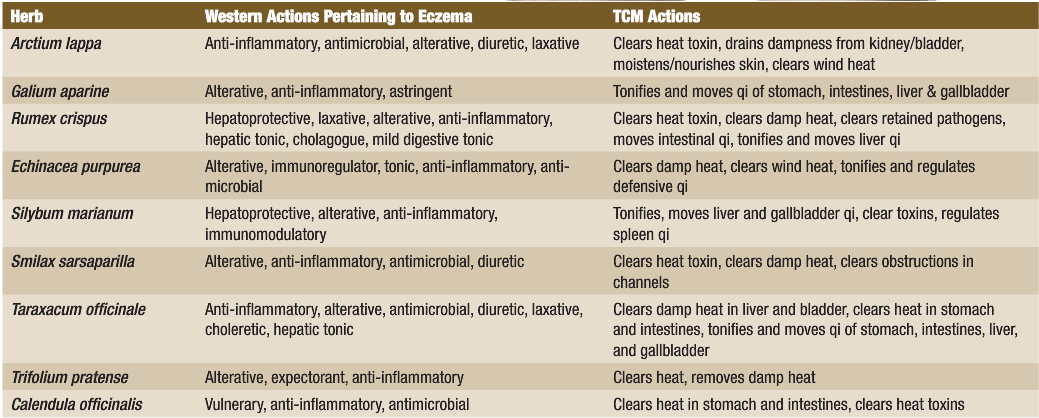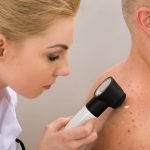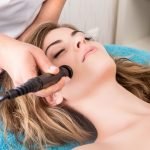Naturopathic Treatment of Eczema
Krista Moyer, ND
Skin conditions are often difficult to treat, whether via conventional or naturopathic medicine. Skin conditions are generally multi-layered, in terms of their causes and, therefore, their needed treatments. This is certainly the case for eczema. Naturopathic treatment options for eczema are vast. A few treatment options combined will at once ensure a better outcome. It can be a slow road, but results should be noticeable within the first 6 weeks.
Remove Obstacles to Cure
When treating eczema, it is important to remember the naturopathic principle Remove the obstacles to cure. In this case, a significant obstacle to cure is the diet. I’ve found the most common foods contributing to injury in eczematous skin to be wheat, dairy, eggs, peanuts, and soy. These foods are generally more inflammatory in nature compared to other foods, consequently tend to induce an immunologic response involving increases in both interferon and CD4 T cells. The resulting excess substance P secretion leads to an increase in pruritic tissue. This, in turn, promotes an increase in cortisol, which may explain why eczema often worsens when patients are stressed.
Digestive dysfunction is almost always at the core. When the digestion of food is compromised for a significant period of time, food particles are incompletely broken down, and the immune system responds to these now-foreign particles. A poorly functioning digestive system prevents key nutrients from being fully absorbed, most notably for eczema: zinc, essential fatty acids, vitamin A, vitamin D, vitamin E, among others. Any of these, when deficient, will impair the body’s ability to maintain and heal the skin. Supplementing these nutrients is therefore essential for eczema. Rarely is an impaired digestive system not involved.
Open The Emunctories
Simply eliminating an allergenic food is not enough. After removing obstacles to cure via elimination of allergenic foods, it is important to then open the main emunctories that haven’t been properly eliminating, mainly the colon, and increasing that pathway’s flow via upregulation of the liver’s detoxification pathways. Supporting these pathways in patients with skin conditions should be slow. I’ve seen patients react and have a worsening of symptoms once the liver is stimulated. This can be avoided when a slow, gentle approach is taken, which I find patients appreciate and understand if you explain the process.
For minor cases, I’ve seen the best results with using a mixture of Schisandra chinensis, Rosmarinus officinalis (rosemary), and Silybum marianum (milk thistle). Using few additional interventions, I find patients’ skin to usually quickly clear of eczematous lesions. For more severe cases, I begin with complex homeopathic drainage remedies for the liver. When I’ve started these remedies at the full dose, patients have often had bad reactions such as nausea, vomiting, headaches, increased irritability, increased pruritis, and an overall worsening of their eczema. For this reason, I start at low dosages (3 gtts TID) and gradually work up to the full dosage of 7-10 gtts TID. I generally start with these remedies along with 1 or 2 other supplements at most. These generally include probiotics (20 billion CFUs QD) and an adrenal support product, depending on the patient’s current stress level and corresponding symptoms.
Additional Considerations
Once patients complete a course of the complex homeopathics, I transition them into a more thorough treatment regimen. At the top of my list of nutraceutical treatments are high dosages of vitamin A, C, and D, and zinc. Because these nutrients are all important for skin health, their continued use will accelerate healing.
Herbal tincture formulations can be very useful. There are many classifications of herbs to consider using in combination (Table 1). When choosing herbs, consider the multiple applications of the various herbs and how they can best match a patient’s particular health concerns. If you mainly use alternatives, keep in mind that there is an increased chance of a worsening of symptoms, as the toxins may be releasing from the tissues faster than the liver and other emunctories can clear them from the body.

Topically speaking, hydration is key. Instructing patients to hydrate within 3 minutes of exiting the shower, or washing hands, will ensure optimal hydration of the skin. My preference is for patients to use straight coconut oil. Augmenting treatments via botanical topicals, I’ve found a mixture of Trifolium pretense (red clover), Arctium lappa (burdock), Juglans nigra (black walnut), Echinacea, Eucalpytus, Calendula, and Hydrastis canadensis (goldenseal) to be extremely valuable, especially for the more minor cases.
Homeopathics
Beyond nutraceuticals and botanicals, homeopathics can take your patient’s healing to the next level. I remember one of my teachers in school telling us that as doctors we have to be detectives. As naturopathic physicians, we generally have more time during visits to investigate the patient’s personality to determine what might make a medicine more appropriate for one patient versus another patient with the same condition. This is particularly important when considering a homeopathic remedy. I often find that patients with chronic eczema have years of deep emotional pain that will surface throughout treatment. This is an excellent opportunity to use the stories they’re telling you to help guide you toward a constitutional homeopathic remedy. I’ve found that the right remedies don’t always include eczema as part of the remedy’s main components. If the correct remedy is selected, the emotional healing will take the patient in that final step in their overall healing, so that he or she is a different person on the other side of the journey.
Like any chronic condition, patience and perseverance will allow your treatment of eczema to be successful.
 Krista Moyer, ND attended the Boucher Institute in New Westminster. Prior to this, she attended the University of Western Ontario where she achieved an honors degree in kinesiology. When Dr Moyer is not in the clinic at Broadway Wellness in Vancouver, British Columbia, she is supervising at the Boucher Institute of Naturopathic Medicine, where she continues to teach and immerse herself in the profession she loves. She continues to write and lecture in the community, to educate and promote the naturopathic profession.
Krista Moyer, ND attended the Boucher Institute in New Westminster. Prior to this, she attended the University of Western Ontario where she achieved an honors degree in kinesiology. When Dr Moyer is not in the clinic at Broadway Wellness in Vancouver, British Columbia, she is supervising at the Boucher Institute of Naturopathic Medicine, where she continues to teach and immerse herself in the profession she loves. She continues to write and lecture in the community, to educate and promote the naturopathic profession.









